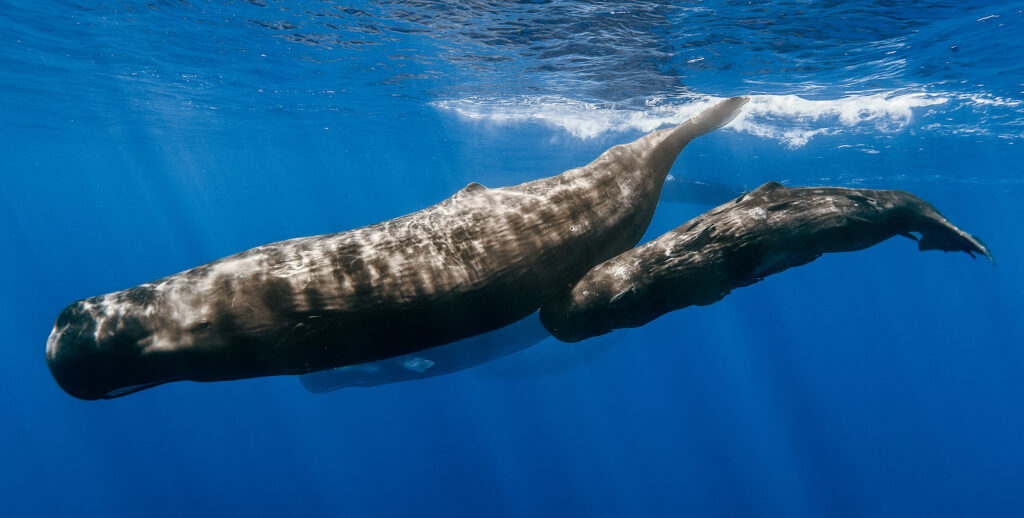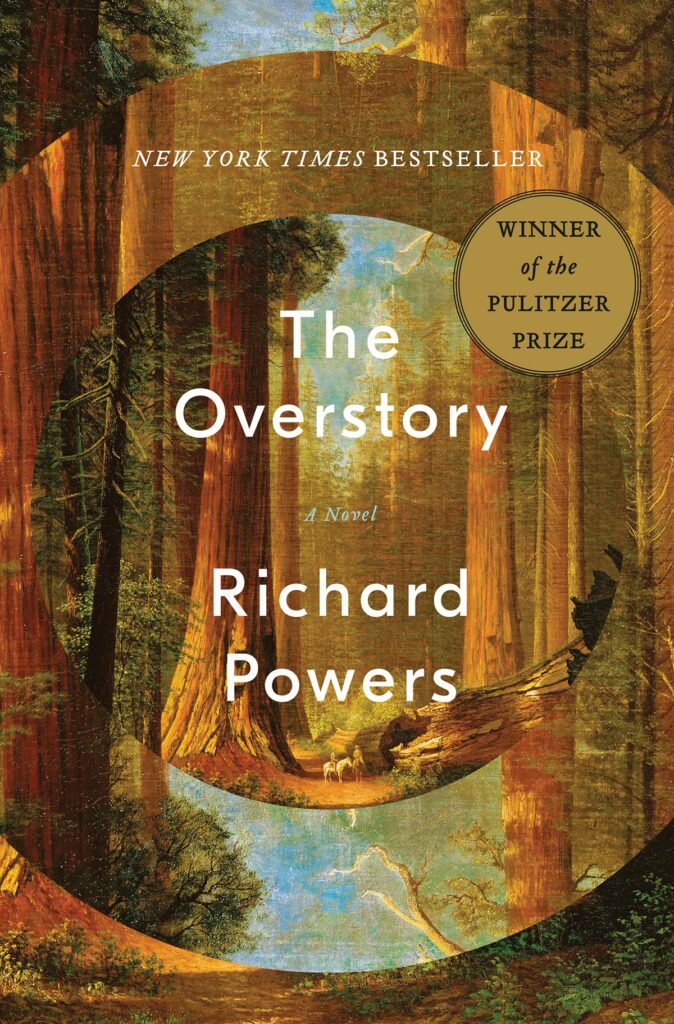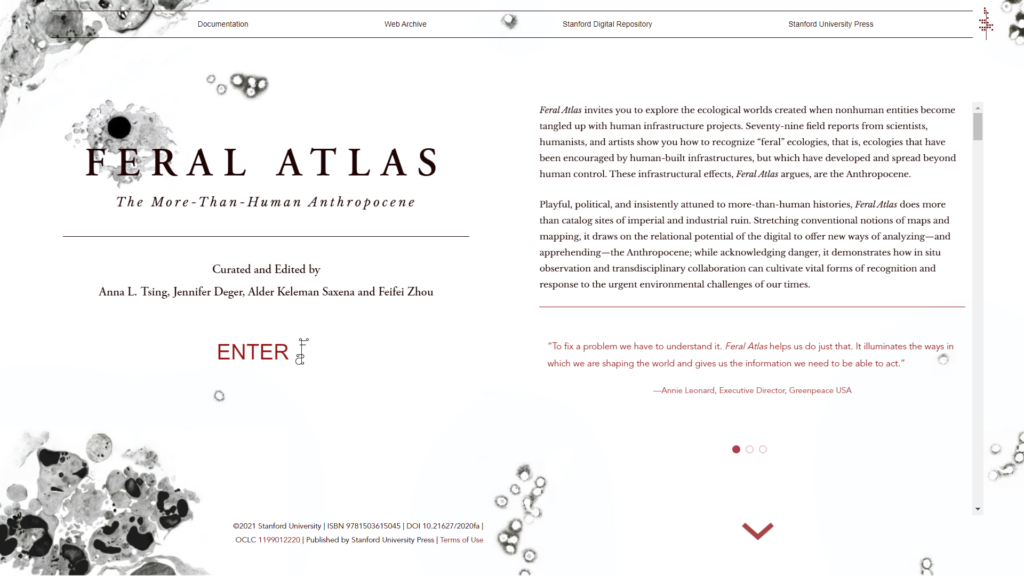The third and final entry in our end-of-year series of recommendations turns to connections with the nonhuman: cephalopods, marine mammals, trees, and more. These recommendations highlight four projects that cultivate and reinforce positive, joyful, and wonder-filled human relationships with other species.
Stacy Alaimo, Immediate Past Co-President
Leave your critical/analytical toolbox behind, where it will remain dry, and give yourself the extraordinary aesthetic pleasure of free diving through a shimmering South African kelp forest with Craig Foster in My Octopus Teacher (2020, dir. Pippa Erlich and James Reed). After a wearying, constricted, and isolating year, this tale of reenchantment and reinvigoration may be just what you need. Even the most skeptical, critical, and cynical among us could find ourselves falling for the beautiful, clever, and inquisitive octopus. We’ve been taught that such love is not proper past childhood – it certainly has no place in mature, scholarly discourse. No matter, you are in the privacy of your own home – free to immerse yourself in this intimate cinematic splendor with joyful abandon! When the credits roll, other creatures, close to home, may catch your attention, with more ordinary but no less vibrant seductions, revealing the exuberant, sustaining relations at the heart of expansive environmental visions. Who better to teach Donna Haraway’s ethic of “significant otherness in relation,” than a curious cephalopod?
Christy Tidwell, Digital Strategies Coordinator
Alexis Pauline Gumbs’ Undrowned: Black Feminist Lessons from Marine Mammals (2020) is an act of love – for marine mammals, for Black people, for queer people, for women, for the world. It is also an act of love for the reader. She says in the introduction, “this book is for you!” It is for activists and dreamers, and for “you, the ones who can’t keep from crying when you read the daily news. And you, the ones who feel cut off from nature. And you, the people who prioritize nature in your lives. And us, the people who are anxious about climate crisis.” Each chapter – organized around instructions like “listen,” “be present,” “respect your hair,” “end capitalism,” “rest” – includes philosophical questions, information about marine mammals, and reflections on what we can learn from these animals. Gumbs asks us to think (“How can we listen across species, across extinction, across harm?”) and learn (“One of the top ten truths I love about walruses? Their deciphering faces. Their whiskers, or vibrissae, are a highly evolved adaptation that they can use to distinguish between tiny items in the sea floor sediment”). Mostly, though, she asks us to love, and she offers love. This love is often clearly directed toward marine mammals themselves (“I love the wild technology of your face”), but sometimes the “you” being addressed is less clear. Is it the walrus, whale, seal? Or is it me?
There are at least three ways to love you: as you were, as you are, as you will be. I love you. That means I choose all three.
There are so many statements of love throughout the book that it is impossible not to feel loved while reading. And this love is the foundation for interpersonal and interspecies care, for political action. Love is the energy that makes possible “another way to breathe.”
May we evolve.

A pod of sperm whales off the coast of Mauritius. (Gabriel Barathieu)
Heidi Hong, Diversity Co-Officer
Feral Atlas is a digital archive of human infrastructures and nonhuman entities in an interconnected world. Curated by Anna Tsing, Jennifer Deger, Alder Keleman Saxena, and Feifei Zhou, the project includes seventy-nine “field reports” that playfully and thoughtfully engage with the concept of “feral ecologies,” or ecologies that were developed alongside human infrastructures but “spread beyond human control.”
Entering the website, you are greeted with a colorful array of illustrated objects – mitochondria, cows, snails, limestone, mushrooms – that dance across the screen. The “critter paintings,” beautifully rendered by Feifei Zhou, are mesmerizing. The menu invites you to “open the drawer,” which expands to an introduction and a set of guidelines on navigating the site. As the editors describe, the atlas “is an iterative art form – a collection of perspectives that teaches us how to look at the world.” Feral Atlas delivers on its promise to teach us how to navigate the world from different perspectives and scales. It is a poetic meditation that invites us to notice details hidden in intricate illustrations of shipping containers, processes of colonial and biological invasion, and the accelerated spread of marine plastics.
Although navigating the wealth of images, videos, and essays on the site may feel overwhelming, Feral Atlas is a joy to explore. I especially enjoyed reading about the artist collaborations and Feifei Zhou’s process of creating four illustrations of infrastructures and the Anthropocene. You could spend hours getting lost in a collections of essays or take your time noticing the vastness of commercial plantations in a video poem.
Jennifer Ladino, Vice President
 When I finished Richard Powers’ The Overstory in the summer of 2018, my first reaction was: I want to go live in a tree! Powers describes his own “religious conversion” beneath a giant redwood as a sense of “being bound back into a system of meaning that doesn’t begin and end with humans.” In emotional terms, what Powers felt sounds like sublime awe: an overwhelming affective experience that decenters our humanness and reshapes the boundaries between self and world. In addition to The Overstory’s beautifully crafted sentences, compelling characters, and awareness that trees are powerful agents in our shared world, the way Powers conveys feelings of awe and its close cousin, wonder, is what I love most about this novel. Wonder is a powerful emotion, more accessible (and less fearful) than awe and less tied to mastery than the sublime. Wonder is a break in the ordinary, a moment of fascination that can spark its verb form: to wonder. Both senses of wonder drive The Overstory’s characters and their environmental activism. As a former park ranger, I was especially taken with Patricia, the humble ranger-naturalist who blends scientific expertise with pure love for the living world. Activism can be seeded with wonder, and – like an aspen grove – emotions of care can spread rhizomatically. In addition to inspiring curiosity, concern, and connectivity, wonder can combat loneliness, and we don’t need a mountaintop or a sequoia sempervirens to prompt it. Moments of wonder are especially valuable in 2020, a year marked by a pandemic, a racial justice reckoning, and climate change-fueled wildfires, their ashes containing homes and lives as well as trees. The Overstory offers a heartening reminder that we are all connected, for worse but also for better, and that – to cite Rebecca Solnit – when it comes to social change, “even things that seem to happen suddenly arise from deep roots in the past or from long-dormant seeds” (Hope in the Dark, xxiv).
When I finished Richard Powers’ The Overstory in the summer of 2018, my first reaction was: I want to go live in a tree! Powers describes his own “religious conversion” beneath a giant redwood as a sense of “being bound back into a system of meaning that doesn’t begin and end with humans.” In emotional terms, what Powers felt sounds like sublime awe: an overwhelming affective experience that decenters our humanness and reshapes the boundaries between self and world. In addition to The Overstory’s beautifully crafted sentences, compelling characters, and awareness that trees are powerful agents in our shared world, the way Powers conveys feelings of awe and its close cousin, wonder, is what I love most about this novel. Wonder is a powerful emotion, more accessible (and less fearful) than awe and less tied to mastery than the sublime. Wonder is a break in the ordinary, a moment of fascination that can spark its verb form: to wonder. Both senses of wonder drive The Overstory’s characters and their environmental activism. As a former park ranger, I was especially taken with Patricia, the humble ranger-naturalist who blends scientific expertise with pure love for the living world. Activism can be seeded with wonder, and – like an aspen grove – emotions of care can spread rhizomatically. In addition to inspiring curiosity, concern, and connectivity, wonder can combat loneliness, and we don’t need a mountaintop or a sequoia sempervirens to prompt it. Moments of wonder are especially valuable in 2020, a year marked by a pandemic, a racial justice reckoning, and climate change-fueled wildfires, their ashes containing homes and lives as well as trees. The Overstory offers a heartening reminder that we are all connected, for worse but also for better, and that – to cite Rebecca Solnit – when it comes to social change, “even things that seem to happen suddenly arise from deep roots in the past or from long-dormant seeds” (Hope in the Dark, xxiv).

